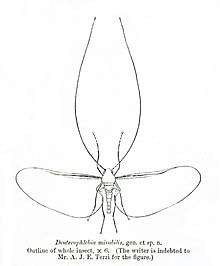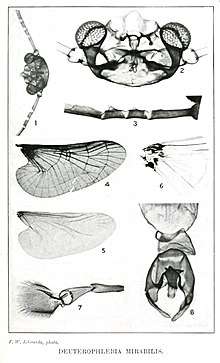Deuterophlebia
The fly genus Deuterophlebia is the sole member of the small monogeneric family Deuterophlebiidae or mountain midges. Adults have broad, fan-shaped wings, and males have extremely long antennae which they employ when contesting territories over running water, waiting for females to hatch.[2] Larvae occur in swiftly flowing streams and are easily recognized by their forked antennae and the prolegs on the abdomen.

Deuterophlebia mirabilis
| Deuterophlebia | |
|---|---|
 | |
| Deuterophlebia mirabilis | |
| Scientific classification | |
| Kingdom: | Animalia |
| Phylum: | Arthropoda |
| Class: | Insecta |
| Order: | Diptera |
| Family: | Deuterophlebiidae Edwards, 1922 |
| Genus: | Deuterophlebia Edwards, 1922[1] |
| Species | |
|
Some 12–15 | |
One classification places this family in its own infraorder Deuterophlebiomorpha, but this has not gained wide acceptance.[3] A recent phylogeny of the entire order Diptera places them as the sister group to all other flies.[4]
References
- "Deuterophlebia". Integrated Taxonomic Information System.
- Alexandr P. Rasnitsyn, Haichun Zhang & Bo Wang (2006). "Bizarre fossil insects: web-spinning sawflies of the genus Ferganolyda (Vespida, Pamphilioidea) from the Middle Jurassic of Daohugou, Inner Mongolia, China" (PDF). Palaeontology. 49 (4): 907–916. doi:10.1111/j.1475-4983.2006.00574.x. Archived from the original (PDF) on 2011-07-18. Retrieved 2007-12-12.
- Walter Hackman & Rauno Väisänen (1982). "Different classification systems in the Diptera" (PDF). Annales Zoologici Fennici. 19: 209–219.
- Wiegmann, B.; et al. (2011). "Episodic radiations in the fly tree of life" (PDF). Proceedings of the National Academy of Sciences. 108 (14): 5690–5. doi:10.1073/pnas.1012675108. PMC 3078341. PMID 21402926.
Further reading
- G. W. Courtney (1990). "Revision of Nearctic mountain midges (Diptera: Deuterophlebiidae)". Journal of Natural History. 24: 81–118. doi:10.1080/00222939000770071.
- G. W. Courtney (1994). "Revision of Palaearctic mountain midges (Diptera: Deuterophlebiidae), with phylogenetic and biogeographic analyses of world species". Systematic Entomology. 19: 1–24. doi:10.1111/j.1365-3113.1994.tb00576.x.
External links
| Wikispecies has information related to Deuterophlebia |
This article is issued from Wikipedia. The text is licensed under Creative Commons - Attribution - Sharealike. Additional terms may apply for the media files.